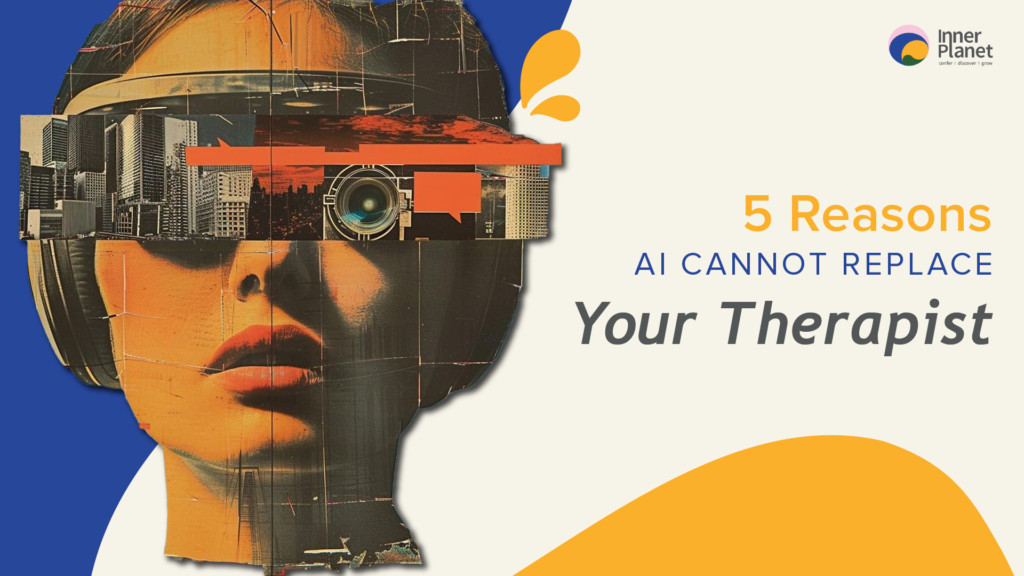The question keeps popping up: Will AI replace therapists?
On one side, artificial intelligence—fast, tireless, and trained on millions of conversations. On the other, therapists—empathetic, intuitive, and deeply human.
Ask an AI tool to be your therapist, and it will certainly admit it’s not ready to take on that responsibility. They’ll list their own limitations: no lived experience, no real connection, no emotional presence. It’s a bit like asking a bookshelf to give a hug—full of knowledge, but not quite equipped for complex emotional support.
AI tools are useful. They support mood tracking, journaling, and managing therapy logistics.
But mental health care is something else entirely. It’s not just reflection or advice—it’s a relationship. One built on trust and the humane skill of supporting someone.
Let’s explore why that difference will always matter!
1. Therapy Is a Relationship, Not a Service
Therapy is more than seeking answers—it’s about connection. A trained therapist doesn’t just respond to spoken words. They notice pauses, body language, and the emotion behind expressions.
That kind of deep presence is something AI doesn’t have. It waits for prompts. It replies. But it doesn’t feel.
Therapy isn’t just about information. It’s about shared understanding. And that’s something that lives in the space between people, not in code.
2. Empathy Is More Than Agreement
AI can sound kind. It can mirror language and tone.
But mirroring isn’t always helpful. Especially in moments of hopelessness, loneliness, or overwhelm, it might just reflect unhelpful agreement.
For example, if someone types, “I always end up alone,” a chatbot might respond, “That must feel awful. You do always end up alone.” That answer was taken as is from an actual AI chatbot.
This may feel validating briefly. But in therapy, the goal isn’t just to agree—it’s to expertly assist someone in reaching insights that lead to new perspectives.
A trained therapist can sit with distress and also guide towards insight. AI cannot do either.
3. Ethics in Therapy Need Clarity
When AI is used to replace online therapy, important questions arise:
- Who sees the data? Some AI tools collect and store emotional information. That deserves serious thought.
- Is consent truly informed? There may be limited awareness about how personal data is used—for example, whether it helps “train” future systems.
- Are we losing the human touch? Automating emotional support risks turning care into a transaction.
These are not critiques of technology itself, but reminders to reflect on therapy and how it’s grounded in transparency and respect. These aren’t concerns that come in the way of expert therapeutic support.
4. Culture, Context, and the Things AI Misses
Emotions are shaped by culture, family, gender, and lived experiences. A phrase like “I want to disappear” can mean very different things depending on a person’s background.
AI can (and often does) miss those nuances. While systems are improving, they don’t yet understand context the way a person can. Nor can they—it would require an impossible marvel of biomechanics like the brain!
Therapists are trained to listen for meaning beneath the surface. They clarify, explore, and respond with sensitivity—especially in moments of distress. That kind of presence is irreplaceable, inimitable.
5. Support Tools Are Not the Same as Support Systems
AI can play a valuable supporting role in mental health maintenance. It helps therapists stay organised, offers mood tracking and journaling features, and can guide users through structured exercises between sessions.
But these are tools, not replacements. The heart of therapy lies in the therapeutic relationship—one that offers not just insight, but attunement and care.
Healing involves sitting with discomfort, recognising patterns, and working through emotional blocks in the presence of another. It calls for discernment, empathy, and the flexibility to adapt to the uniqueness of each individual.
That kind of support system cannot be automated. It must be human.
AI continues to evolve. It supports mental health in new and important ways. But some aspects of healing—like deep understanding, emotional presence, and the safety of being truly seen—remain uniquely human.
Those seeking that kind of support may find that mental health care with a trained professional offers something no app can replicate.
And remember, if you need help, we’re always just a call away!


